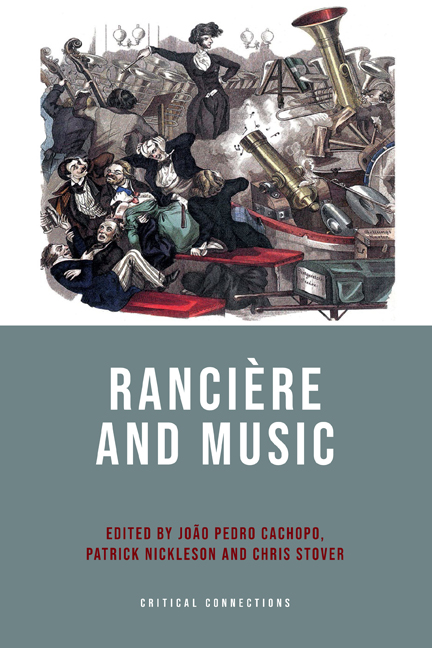Book contents
- Frontmatter
- Contents
- List of Examples
- Acknowledgements
- Notes on Contributors
- Introduction
- Part I: Music and Noise
- 1 Musique concrète and the Aesthetic Regime of Art
- 2 ‘Rip it up and start again’: Reconfigurations of the Audible under the Aesthetic Regime of the Arts
- 3 A Lesson in Low Music
- Part II: Politics of History
- 4 Wandering with Rancière: Sound and Structure under the Aesthetic Regime
- 5 Staging Music in the Aesthetic Regime of Art: Rancière, Berlioz and the Bells of Harold en Italie
- 6 Rancière on Music, Rancière’s Non-music
- 7 Coloured Opera and the Violence of Dis-identification
- Part III: Politics of Interaction
- 8 Musical Politics in the Cuban Police Order
- 9 Rancière and Improvisation: Reading Contingency in Music and Politics
- 10 Rancière’s Affective Impropriety
- Part IV: Encounters and Challenges
- 11 Rancière, Resistance and the Problem of Commemorative Art: Music Displacing Violence Displacing Music
- 12 Stain
- 13 On Shoemakers and Related Matters: Rancière and Badiou on Richard Wagner
- 14 Roll Over the Musical Boundaries: A Few Milestones for the Implementation of an Equal Method in Musicology
- Afterword
- A Distant Sound
- Works Cited
- Index
12 - Stain
Published online by Cambridge University Press: 03 October 2020
- Frontmatter
- Contents
- List of Examples
- Acknowledgements
- Notes on Contributors
- Introduction
- Part I: Music and Noise
- 1 Musique concrète and the Aesthetic Regime of Art
- 2 ‘Rip it up and start again’: Reconfigurations of the Audible under the Aesthetic Regime of the Arts
- 3 A Lesson in Low Music
- Part II: Politics of History
- 4 Wandering with Rancière: Sound and Structure under the Aesthetic Regime
- 5 Staging Music in the Aesthetic Regime of Art: Rancière, Berlioz and the Bells of Harold en Italie
- 6 Rancière on Music, Rancière’s Non-music
- 7 Coloured Opera and the Violence of Dis-identification
- Part III: Politics of Interaction
- 8 Musical Politics in the Cuban Police Order
- 9 Rancière and Improvisation: Reading Contingency in Music and Politics
- 10 Rancière’s Affective Impropriety
- Part IV: Encounters and Challenges
- 11 Rancière, Resistance and the Problem of Commemorative Art: Music Displacing Violence Displacing Music
- 12 Stain
- 13 On Shoemakers and Related Matters: Rancière and Badiou on Richard Wagner
- 14 Roll Over the Musical Boundaries: A Few Milestones for the Implementation of an Equal Method in Musicology
- Afterword
- A Distant Sound
- Works Cited
- Index
Summary
Excursus 1: Shopping Malls I. Some of us haunt shopping malls late into the evening after the stores have closed. We do so in part for the music. During the day, shopping mall music constitutes a normally unobtrusive backdrop for the hard labour of commerce and capital. But mall music is transformed fundamentally when commerce ends, along lines comparable to Rancière's ‘double heteronomy’. Shoppers having parted, mall music emerges from its unobtrusive backdrop, and this is its first heteronomy. Oh, how it reverberates in empty halls devoid of footfalls and chatter. It works its way into every mall corner, chasing us down to insist upon its legitimacy, worthy of attention. Its normal pleasantries become an insistent liturgy: can you not hear how soothing and attractive it is? But in being so insistently pleasant, it emphasises its customary dependence upon commerce. Who, after all, needs pleasantries, when the customary irritants of shopping are removed. Mall music thus reverberates in an emphatic solitude not as an autonomous and absolute thing but instead as lonely and incomplete, as if tinted or stained by commerce and by capital. Thus it serves in its lonely solitude to reveal, as its second heteronomy, how truly unpleasant mall shopping and the spectre of capital can be.
This essay frames Rancière's concepts of the stain and the count by reference first to Adorno's concept of remainder and later to Derrida's writings on aporia. I shall frame this in terms of dialectics. In essence, the substance of dialectics is not synthetic. As a student of Marx, I mean substance in two senses of the term: a physical, material matter, as opposed to an insubstantial illusion; and ultimately the substance of physical labour as part of all human constructions. Substance lies in that which is left behind as a remainder in synthesis, and which in turn puts synthesis into question. Since all three philosophers are concerned with humans and humanity, I shall phrase this remainder in human terms, as a state of affairs suffered by humans, this under the aegis of capitalism.
Capital is based on the abstract transformation of original labour into congealed labour time and exchange value. For a capitalist, such a transformation is synthetic, producing capital.
- Type
- Chapter
- Information
- Ranciere and Music , pp. 290 - 311Publisher: Edinburgh University PressPrint publication year: 2020



